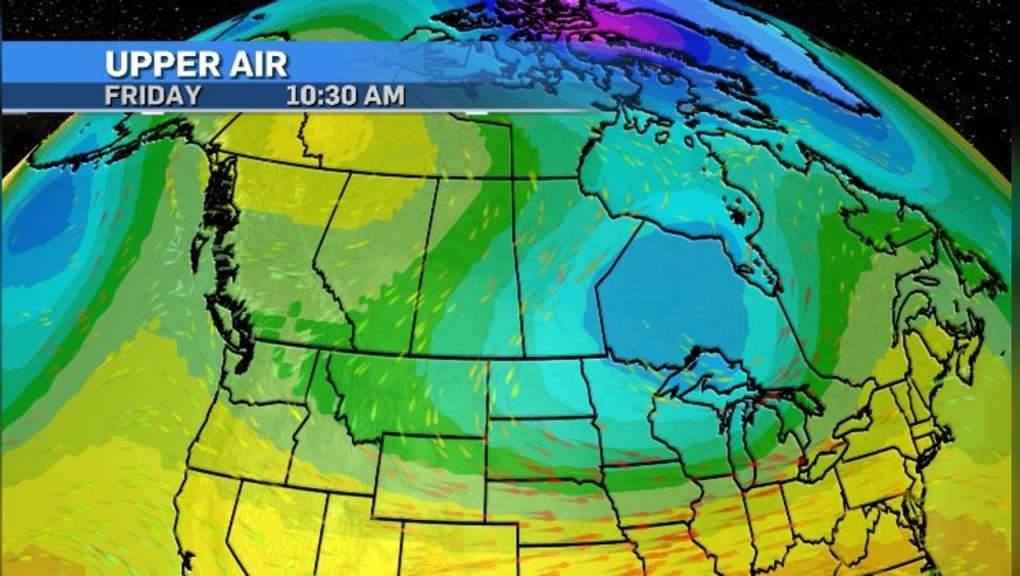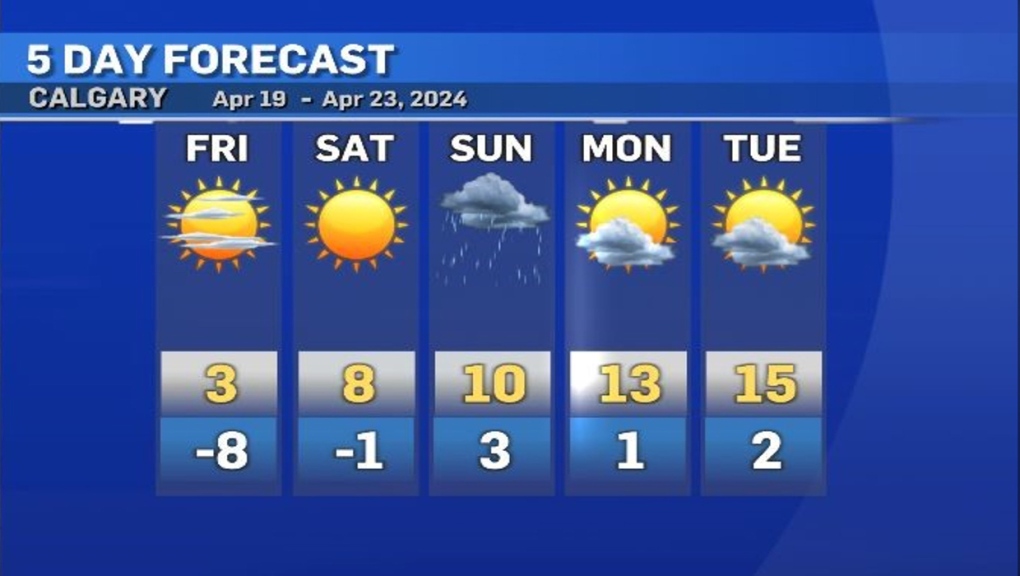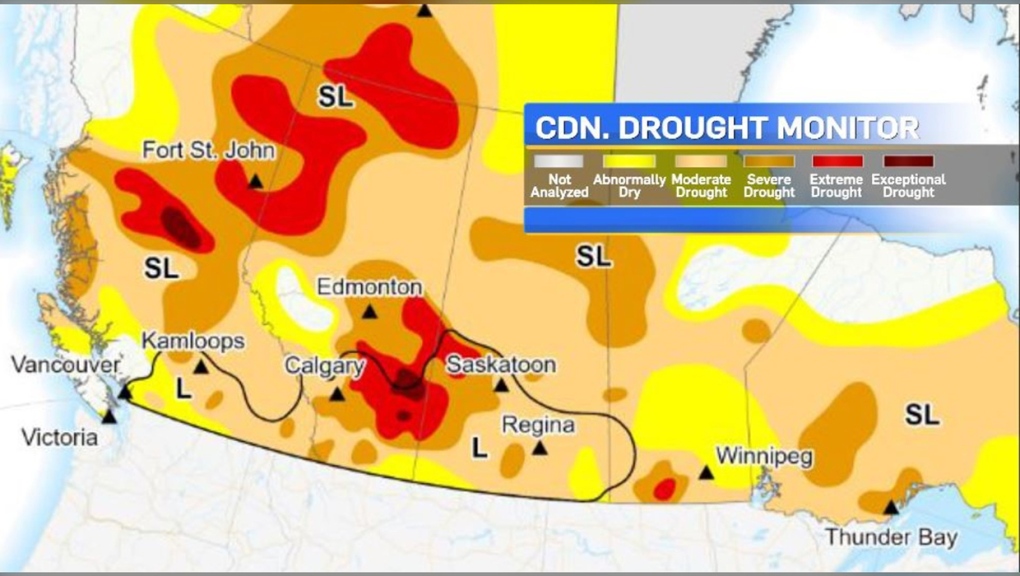Upcoming warm, dry conditions not helping drought conditions or wildfire risk
 By early next week the weather pattern is expected to shift and warmer air should flow over the southern Rockies, dropping moisture on the B.C. side (as per typical adiabatic processes) and allow warm, dry air to settle over southern Alberta.
By early next week the weather pattern is expected to shift and warmer air should flow over the southern Rockies, dropping moisture on the B.C. side (as per typical adiabatic processes) and allow warm, dry air to settle over southern Alberta.
After a week centred around inconsistent weather conditions, Calgary will experience a reset and return to seasonal conditions over the weekend.
The large low-pressure system that brought cold and wet conditions into Alberta Tuesday and Wednesday is still the main driver of our current weather – despite this low being centred over central Canada. The outer edges of the system extend as far west as the Rockies, and the counter-clockwise circulation around the low continues to grab colder air from the north and drive it south into the foothills.
As a result, the daytime high in Calgary on Friday is forecast to be nine-degrees below seasonal and wind will be primarily from the north.
 The large low-pressure system that brought cold and wet conditions into Alberta Tuesday and Wednesday is still the main driver of our current weather – despite this low being centred over central Canada.
The large low-pressure system that brought cold and wet conditions into Alberta Tuesday and Wednesday is still the main driver of our current weather – despite this low being centred over central Canada.
By early next week the weather pattern is expected to shift and warmer air should flow over the southern Rockies, dropping moisture on the B.C. side (as per typical adiabatic processes) and allow warm, dry air to settle over southern Alberta.
In the transition period on Sunday there is a chance of light and scattered rain throughout the region, however precipitation totals are likely to remain low.
 By early next week the weather pattern is expected to shift and warmer air should flow over the southern Rockies.
By early next week the weather pattern is expected to shift and warmer air should flow over the southern Rockies.
The moisture from last week offered some relief in terms of offsetting short-term drought conditions, but according to Agriculture and Agri-Food Canada (AAFC) most of Alberta is still far too dry.
In their April 5, 2024 report, the agency explains most of central and southern Alberta are under long-term drought conditions, with some areas having received less than 50 per cent of the expected moisture from the end of Sept. 2023 until the end of March 2024.
Some communities east of Highway 2/QEII saw slight improvements in the size of their driest areas, however as of the most current drought monitor map (to March 31, 2024) “drought intensity” classifications in this area range from D2 (one in 10 year event) to D4, or the worst rating, which is a one in 50 year event.
 In their April 5, 2024 report, the agency explains most of central and southern Alberta are under long-term drought conditions, with some areas having received less than 50 per cent of the expected moisture from the end of Sept. 2023 until the end of March 2024.
In their April 5, 2024 report, the agency explains most of central and southern Alberta are under long-term drought conditions, with some areas having received less than 50 per cent of the expected moisture from the end of Sept. 2023 until the end of March 2024.
The months of May, June, July have historically been the wettest months around the Calgary area, bringing in more than half of the annual moisture, however moisture stores (snow pack, soil moisture) are critical in offsetting water shortages.
According to the AAFC “Concern for water supplies remains as we move into the growing season with many reservoirs reporting significantly lower than normal levels this winter.“
Drought conditions in Northern Alberta declined at an even faster rate, which is contributing to concerns for the upcoming wildfire season.
In the wildfire update from April 18, 2024, Alberta Wildfire Information Manager Christie Tucker noted Alberta started the 2024 wildfire season with 64 wildfires still burning from last year, so “firefighters are entering this spring with a heavier fire load than usual.”
Twenty seven of those have been extinguished, leaving 37 holdover fires.
Tucker said drought conditions enhance wildfire risk as dry trees and grasses can burn – “particularly in the high winds [as of late].”
CTVNews.ca Top Stories

Forecasters issue 'bomb cyclone' warning for B.C., with 120 km/h winds predicted
An Environment Canada meteorologist says a so-called "bomb cyclone" is expected to bring powerful winds to Vancouver Island and the British Columbia coast this week.
Canada's rising youth unemployment could cost the country billions, report says
The unemployment rate for Canadians between 18 and 24 was 12.8 per cent in October, according to Statistics Canada, more than double the rate of those older than 25.
Tories call on Boissonnault to resign amid apology over Indigenous ancestry claims
Members of Parliament returned to Ottawa on Monday after a weeklong break with no sign of a resolution to the House stalemate, tempers ramped back up, and renewed calls for a Liberal cabinet minister to resign — or be fired.
B.C. RCMP detachment refutes social media claims of human trafficking, kidnapping
Mounties in B.C.'s Sea to Sky region say there is "no credible evidence" to support claims circulating on social media that a human trafficking ring is operating in Squamish or that there have been kidnappings in the community.
Men from Ontario, B.C. charged in 'mistaken identity' shooting, RCMP say
Two men from Ontario and British Columbia have been charged in connection with a 2022 shooting that left an innocent victim seriously wounded.
NHL referee Mitch Dunning communicative, can move extremities following violent collision
NHL referee Mitch Dunning is fully communicative and can move all his extremities following a violent collision with Colorado defenseman Josh Manson in Monday night's game at Philadelphia.
Dave Coulier debuts shaved head with a little help from his friend John Stamos
As Dave Coulier continues to go through cancer treatment, he is getting some support from his friend John Stamos.
Some Canada-U.S. border crossing times will change in 2025. Here's what you need to know
The Canada Border Services Agency (CBSA) says it will adjust the opening hours of crossing points across the country early next year.
Thief steals disabled 15-year-old dog's wheelchair
Caring for a senior pet is no walk in the park, especially when the pet can't walk at all. A Colorado woman was shocked to find her dog's wheelchair missing from the porch Tuesday morning


































